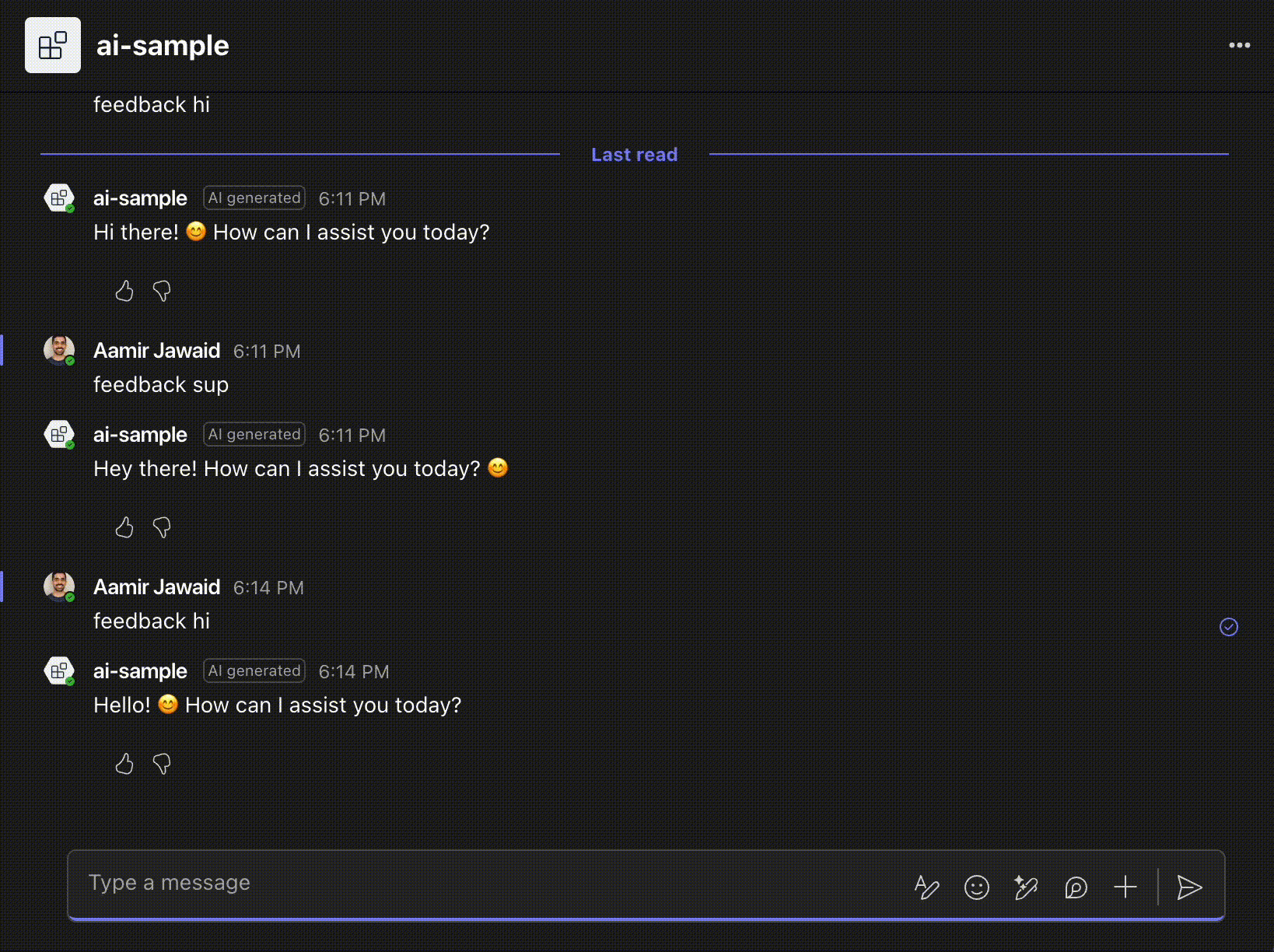Feedback
User feedback is essential for the improvement of any application. Teams provides specialized UI components to help facilitate the gathering of feedback from users.

Storage
Once you receive a feedback event, you can choose to store it in some persistent storage. In the example below, we are storing it in an in-memory store.
// This store would ideally be persisted in a database
public static class FeedbackStore
{
public static readonly Dictionary<string, FeedbackData> StoredFeedbackByMessageId = new();
public class FeedbackData
{
public string IncomingMessage { get; set; } = string.Empty;
public string OutgoingMessage { get; set; } = string.Empty;
public int Likes { get; set; }
public int Dislikes { get; set; }
public List<string> Feedbacks { get; set; } = new();
}
}
Including Feedback Buttons
When sending a message that you want feedback in, simply AddFeedback() to the message you are sending.
var sentMessageId = await context.Send(
result.Content != null
? new MessageActivity(result.Content)
.AddAiGenerated()
/** Add feedback buttons via this method */
.AddFeedback()
: "I did not generate a response."
);
FeedbackStore.StoredFeedbackByMessageId[sentMessageId.Id] = new FeedbackStore.FeedbackData
{
IncomingMessage = context.Activity.Text,
OutgoingMessage = result.Content ?? string.Empty,
Likes = 0,
Dislikes = 0,
Feedbacks = new List<string>()
};
Handling the feedback
Once the user decides to like/dislike the message, you can handle the feedback in a received event. Once received, you can choose to include it in your persistent store.
[Microsoft.Teams.Apps.Activities.Invokes.Message.Feedback]
public Task OnFeedbackReceived([Context] Microsoft.Teams.Api.Activities.Invokes.Messages.SubmitActionActivity activity)
{
var reaction = activity.Value?.ActionValue?.GetType().GetProperty("reaction")?.GetValue(activity.Value?.ActionValue)?.ToString();
var feedbackJson = activity.Value?.ActionValue?.GetType().GetProperty("feedback")?.GetValue(activity.Value?.ActionValue)?.ToString();
if (activity.ReplyToId == null)
{
_log.LogWarning("No replyToId found for messageId {ActivityId}", activity.Id);
return Task.CompletedTask;
}
var existingFeedback = FeedbackStore.StoredFeedbackByMessageId.GetValueOrDefault(activity.ReplyToId);
/**
* feedbackJson looks like:
* {"feedbackText":"Nice!"}
*/
if (existingFeedback == null)
{
_log.LogWarning("No feedback found for messageId {ActivityId}", activity.Id);
}
else
{
var updatedFeedback = new FeedbackStore.FeedbackData
{
IncomingMessage = existingFeedback.IncomingMessage,
OutgoingMessage = existingFeedback.OutgoingMessage,
Likes = existingFeedback.Likes + (reaction == "like" ? 1 : 0),
Dislikes = existingFeedback.Dislikes + (reaction == "dislike" ? 1 : 0),
Feedbacks = existingFeedback.Feedbacks.Concat(new[] { feedbackJson ?? string.Empty }).ToList()
};
FeedbackStore.StoredFeedbackByMessageId[activity.Id] = updatedFeedback;
}
return Task.CompletedTask;
}